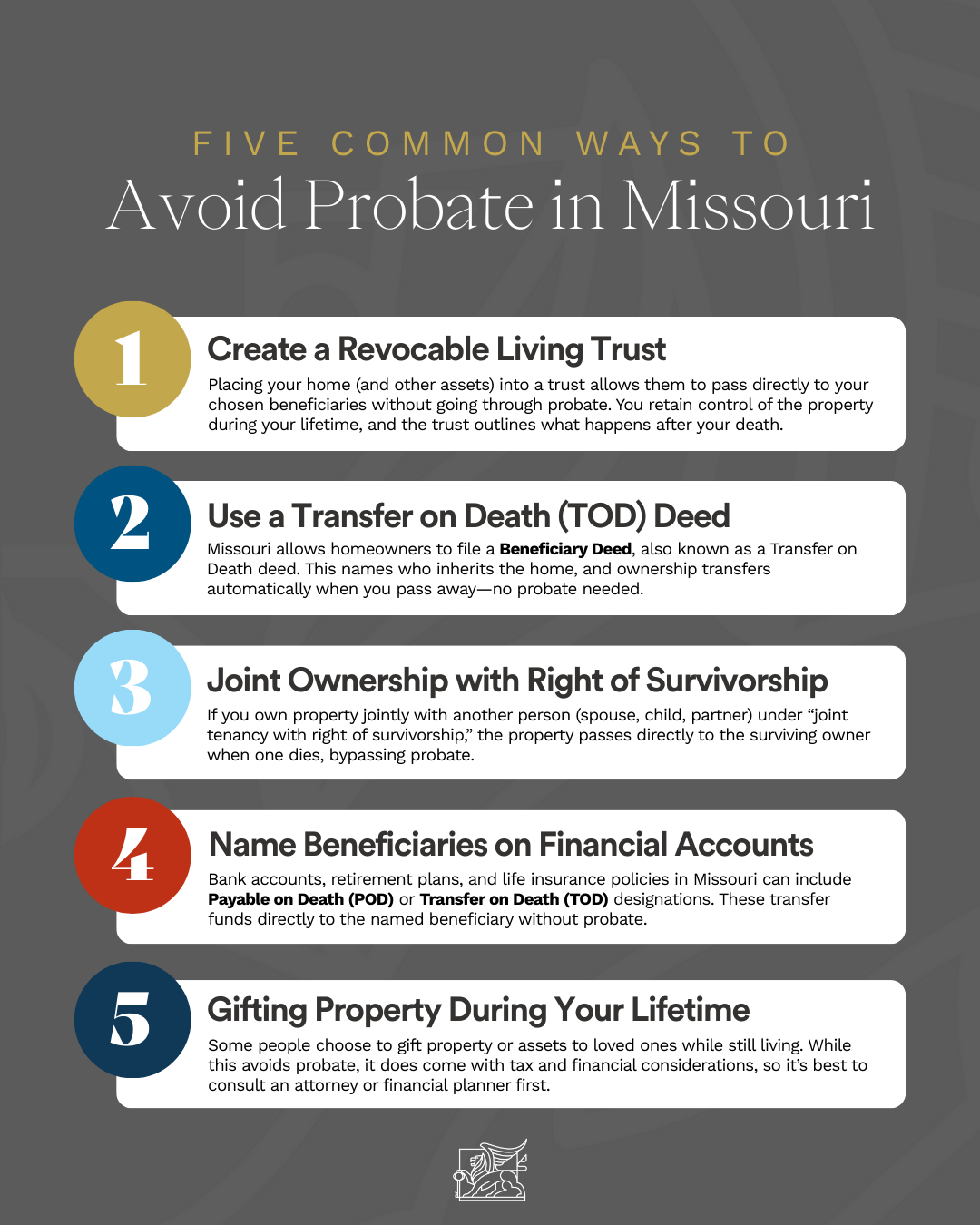Missouri Probate Explained: Who Gets Your Home if There’s No Will
Probate can be a confusing issue for home sellers and home buyers. Missouri probate is the legal process that determines what happens to someone’s home and property after they pass away. If there is no will in place, state law—known as intestate succession—decides who inherits the home and how the probate process unfolds.
Intestate Succession in Missouri
When someone passes away without a will, they are said to have died “intestate.” Missouri law then decides who inherits their property, including their home. The distribution depends on whether the person was married, had children, or had other close relatives.
- Married with children (all with the same spouse): The surviving spouse inherits the first $20,000 of the estate plus half of the remaining balance. The children share the other half.
- Married with children from another relationship: The surviving spouse receives half, and the children (from all relationships) share the other half.
- Married with no children: The spouse inherits everything.
- Not married, no children: The estate passes to parents, siblings, or more distant relatives, depending on who survives.
- No living relatives: The property eventually “escheats” to the State of Missouri.
This can get complicated—especially in blended families or when ownership of the home is shared.
The Probate Process
Probate is the legal process by which a court oversees the distribution of a deceased person’s assets, including real estate. Here’s what typically happens in Missouri:
- Filing with the Probate Court
A family member or interested party petitions the local probate court to open an estate. - Appointing a Personal Representative
The court appoints someone (often called an “executor” or “administrator”) to manage the estate. This person gathers information about debts, assets, and heirs. - Identifying and Valuing Assets
The estate’s property, including the home, must be inventoried and appraised. - Paying Debts and Taxes
Before anyone can inherit, the estate must settle outstanding debts (such as mortgages, medical bills, or taxes). - Distributing Remaining Property
Once debts are handled, the court distributes the home and other assets according to Missouri’s intestacy laws. This may involve selling the home and dividing proceeds if multiple heirs are entitled to a share.
How Long Does Probate Take in Missouri?
One of the most common questions we hear is: “How long will the home be tied up in probate?” In Missouri, the answer is usually at least one year.
That’s because state law gives creditors up to 12 months from the date of death to file claims against the estate. Until that window closes, the probate court cannot fully distribute property, including the home. Even in a simple estate with no disputes, this waiting period means heirs often can’t sell or transfer clear title to the property for a year or more.
Are There Exceptions?
- Small Estates: If the entire estate is worth less than $40,000, heirs may be able to use a simplified process called a Small Estate Affidavit, which can shorten the timeline.
- Non-Probate Transfers: Homes held in a living trust, in joint tenancy with right of survivorship, or with a Transfer on Death (TOD) deed bypass probate entirely, allowing heirs to inherit immediately.
- Spousal and Family Rights: A surviving spouse or minor children may be entitled to continue living in the home during probate under Missouri law.

Why Planning Ahead Helps
For many families, the year-long probate period creates stress and uncertainty. Planning tools like TOD deeds or revocable living trusts can help ensure your home transfers smoothly and without delay.
Takeaway
Losing a loved one is hard enough without the added stress of navigating probate. Without a will, the fate of a family home may not match what the deceased would have wanted—and the process can stretch out for a year or more.
If you own a home in Missouri, consider speaking with an estate planning attorney about creating a will, trust, or beneficiary deed. It’s one of the best gifts you can leave your loved ones.

